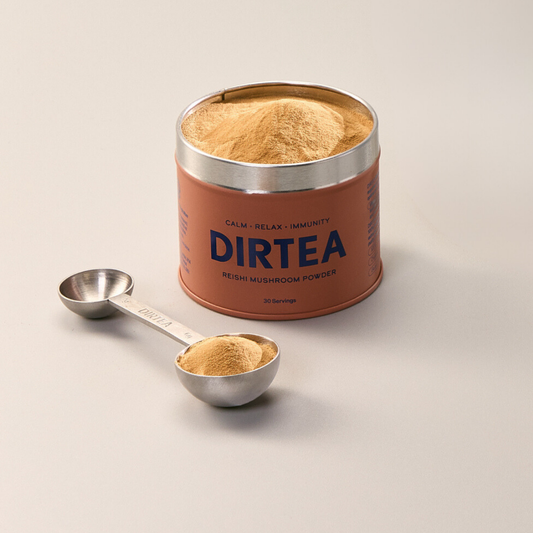Stress Less, Live More: Strategies for a Happier You

Share
In the hustle and bustle of modern life, stress can often feel like an unavoidable sidekick. From looming deadlines to endless to-do lists, it's no wonder our stress levels can skyrocket. According to Stress.org, the global average number of stressed people out of 143 countries is 35%, and 55% of Americans are stressed during the day. (1) But fear not, our fellow stress warriors! With a sprinkle of science and a dash of functional mushrooms, we can unlock the secrets to keeping stress at bay and reclaiming our inner peace. Let's dive into some easy, science-backed strategies to less stress.
Mindfulness Meditation: Picture this – you're sitting comfortably, focusing on your breath, and gently letting go of distracting thoughts. That is mindfulness meditation in a nutshell - it’s easier than you think! Studies have shown that regular mindfulness practice can reduce stress, (2) increase resilience, and even improve overall well-being. So next time you're feeling frazzled, take a few minutes to tune into the present moment – your brain will thank you for it!
Deep Breathing Exercises: Ah, the sweet serenade of oxygen filling your lungs like a symphony of tranquillity. Deep breathing exercises, such as diaphragmatic or box breathing, can help activate the body's relaxation response and calm the nervous system. Plus, they're super easy to do—no lab equipment required!

Get Moving: It's time to get those endorphins flowing! Regular physical activity, whether dancing, walking, or hitting the gym, can work wonders for reducing stress and boosting mood. Exercise helps release feel-good neurotransmitters like serotonin and dopamine while providing a healthy outlet for pent-up energy and tension. The American Psychology Association website states that in a survey, 62% of adults who say they exercise or walk to help manage stress say the technique is very or extremely effective. (3)
DIRTEA Reishi: One natural remedy that has gained popularity for its stress-reducing properties is the Reishi mushroom. Reishi, also known as the "mushroom of immortality," has been used for centuries in traditional Chinese medicine for its adaptogenic and calming effects on the body. Reishi contains bioactive compounds called triterpenes and polysaccharides, which have been shown to modulate the body's stress response and promote relaxation. By incorporating Reishi into your wellness routine, whether through teas or mixed-in drinks, you can support your body's ability to adapt to stressors and cultivate a greater sense of calm and balance in your life. Try our pure double-extracted Reishi for the most effective results.

Connect with Others: Humans are naturally social creatures, and our connections with others play a vital role in reducing stress. Whether chatting with a friend, cuddling with a pet, or joining a social club, fostering meaningful connections can provide support, comfort, and a sense of belonging – all essential ingredients for stress resilience.
Prioritise Sleep: Sweet slumber – the unsung hero of stress reduction. Quality sleep is crucial for regulating stress hormones, consolidating memories, and restoring energy levels. Aim for 7-9 hours per night, create a relaxing bedtime routine, and banish those pesky screens from the bedroom for a restful night's sleep. The American Psychology Association website says that adults who sleep fewer than eight hours a night report higher stress levels than those who sleep at least eight hours a night (5.5 vs. 4.4 on a 10-point scale). On average, adults with lower reported stress levels report sleeping more hours a night than adults with higher reported stress levels (7.1 vs. 6.2 hours). (4) Sometimes it’s easier said than done, and sleep doesn’t come easily - this can be really frustrating and stressful. DIRTEA Reishi can help support sleep by soothing nerves and promoting restful sleep.
Practice Gratitude: It may sound simple, but cultivating an attitude of gratitude can profoundly affect stress levels and overall well-being. Take a few moments each day to reflect on what you're thankful for – whether it's a sunny day, a delicious meal, or the company of loved ones. Gratitude helps shift your focus from stressors to blessings, fostering a sense of contentment and peace.
So there you have it, folks—seven easy, science-backed strategies for reducing stress and embracing a happier, healthier life. Remember, stress may be a part of life, but it doesn't have to rule it. With a little mindfulness, movement, and a dose of Reishi, you can conquer stress like a boss and live your best, most stress-free life. Now go forth and de-stress!
References
- Stress.org (2023). What is stress? Available at: https://www.stress.org/daily-life. (Accessed: 20 March 2024)
- A, Chiesa and A, Serrett. (2024). ‘Mindfulness-Based Stress Reduction for Stress Management in Healthy People: A Review and Meta-Analysis.’ The Journal of Alternative and Complementary Medicine, 15(5), Pp. 593-600 http://doi.org/10.1089/acm.2008.0495
- American Psychological Association (2014). ‘Stress and Exercise’. Available at: https://www.apa.org/news/press/releases/stress/2013/exercise (Accessed: 20 March 2024)
- American Psychological Association (2014). ‘Stress and Sleep’. Available at: https://www.apa.org/news/press/releases/stress/2013/sleep#:~:text=Adults%20who%20sleep%20fewer%20than,6.2%20hours) (Accessed: 20 March 2024)






